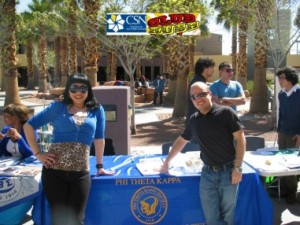 Greetings to all! This is a belated March Chronicle, which primarily serves to lay a foundation for the college-wide town hall meetings that begin next week. I plan to share additional details as available from the state and Nevada System of Higher Education at those sessions.
Greetings to all! This is a belated March Chronicle, which primarily serves to lay a foundation for the college-wide town hall meetings that begin next week. I plan to share additional details as available from the state and Nevada System of Higher Education at those sessions.
Surveys and focus groups
Over the past several weeks a number of surveys and focus groups have been held at CSN addressing a variety of topics. I want to express my appreciation to all of you who participated. Whether the topic has been Achieving the Dream, these upcoming town halls, or CSN’s work climate, your input has been valuable and generously given. Thank you.
Student Success
As you know, CSN, and all of Nevada’s colleges and universities, are engaged in a national effort to bolster student completion and success. There is a lot happening. To summarize CSN’s actions so far and how they fit with the nation and Nevada’s agenda, I would like to draw your attention to this two-page summary. Please note that this document is part of a work in progress. It will be revised and updated as CSN further develops its student success model.
|
CSN’s enrollment has continually declined since the height of the recession. This has occurred for a number of reasons: an improving economy, increases in tuition and fees, policy changes, etc. While this is a national trend for community colleges, I’ve asked CSN’s Institutional Research Office to help further explain the trend. CSN is also embarking on a systematic enrollment management process that you will hear more about during the next academic year to more strategically target outreach and retention efforts. |
Compensation and Budget Status
These two issues will be major topics at the town hall meetings, but I want to provide some general information to ensure everyone is on the same page.
The Board of Regents and CSN’s top legislative priorities have been to restore salaries and eliminate furloughs. While the Governor is recommending a flat budget and an elimination of furloughs by July 1, 2014, I urge you to contact your elected representatives to address the full correction of salaries and reiterate the importance of ending as soon as possible unpaid days off.
Additional updates:
- The PEPB board is recommending no significant changes in the employee benefits package for the next biennium.
- The new budget formula is under careful review by leaders of the Legislature. Changes are expected in the formula as the Legislature finalizes budgets for the next biennium and as new data becomes available, including the Economic Forum recommendations issued in May.
Again, I urge advocacy. Let legislators know what you are experiencing with salary roll backs and furloughs. Tell them about CSN’s funding needs. Express your thoughts about the state’s benefits plan. They need to hear from you.
You can find legislators’ contact information here.
|
Thanks to our facilities staff for monitoring our construction projects! Improvements are underway in each of our campuses: new sidewalks, building systems, signs, wayfinding and more. Building A renovations will soon be underway. Facilities staff are also assessing campus safety for pedestrians that may require new crosswalks and pathways. Please know that funding for facilities projects comes from revenues restricted for capital needs. These funds cannot be used for operating, salaries or compensation, or travel. Restrictions require CSN use capital funds for capital projects and the college has a maintenance backlog of building and space needs. For the renovation of Building A on the West Charleston campus, the CSN received approval for a bank loan, since state funding was not available. |
Tenure Recipients
I wish to express my congratulations to our faculty for whom the Board of Regents approved tenure at their meeting in March. Congratulations to all!
Dr. Michael Bakst
Dr. Pam Lum
Ms. Cheryll Carlock-Arinwine
Dr. Elisabeth Morton McLaren
Ms. Connie Christensen
Ms. Sarah New
Mr. Ted Chodock
Mr. Nalin Pant
Dr. Margaret Lisa W. Clayton
Dr. Owen L. Pillion
Dr. Kenneth Hochstetter
Mr. Sean Russell
We will be celebrating these individuals among others at the upcoming Reflection of Success event on Friday May 17.
Outstanding Student Awards Ceremony
 Make sure to mark your calendars. The Outstanding Student Awards Ceremony will take place on Friday, May 3, at 5:30 p.m. at the Texas Station. This growing event honors some of our remarkable students and their inspiring achievements. An invitation will be going out shortly.
Make sure to mark your calendars. The Outstanding Student Awards Ceremony will take place on Friday, May 3, at 5:30 p.m. at the Texas Station. This growing event honors some of our remarkable students and their inspiring achievements. An invitation will be going out shortly.
Questions from Faculty and Staff Members:
“What is the next step on the distance education report that the Board of Regents received?”
The Richard Katz distance education report was presented to the Regents with 16 recommendations. Nearly all require new investments of state funds. The Board directed the Chancellor to establish a committee of faculty and staff to assess the report and recommendations. Names of faculty and staff nominees were sent to the Chancellor, but the committee has yet to be formed.
“What is CSN’s success rate?”
There is no institutional success rate. In general, there are three major indicators that CSN and many other higher education institutions use to assess how students are faring.
Graduation Rates: Graduation rates are based off a cohort of first-time, full-time degree seeking students that graduate with a certificate or degree over a specified time period. Since approximately three quarters of our students attend CSN part time, this cohort measurement is flawed and represents about 5 percent of our students.
Based on the 2005 cohort, CSN’s graduation rate is 11 percent and has been climbing over the past few years. CSN’s transfer rate is 16 percent.
Success or Completion rates: Do not confuse this indicator with overall institutional success. This variable represents the percentage of students who pass courses with a C or above during a given semester. CSN’s course success rate at C (or better) is 69.7 percent for fall 2012.
Persistence rates: This indicator represents the percentage of students who continue from fall to spring semester or fall to fall. CSN’s persistence rate from fall 2011 to spring 2012 is 65 percent and from fall 2011 to fall 2012 is 46 percent.
While these three statistics do not represent the sum of our mission, they are useful measurements that let us know when and where we have problems and successes. You should know that two areas of focus for the Achieving the Dream effort is looking at are which types of students tend not to persist and complete high-demand courses.
“Why have we been overworked and underpaid for four years, and when will we receive back pay?”
 Actually, the circumstances described above have been in place for six years.
Actually, the circumstances described above have been in place for six years.
The State of Nevada has not had the economic strength to support adequately fund higher education. No back pay will be funded for any employee group. You’ve sacrificed a lot and as discussed above, you’re not done.
You can take solace, if you will, in reports that Nevada’s economy is getting stronger. This is the first session in six years where we are not talking about closing centers, layoffs, attrition and pay cuts.
You can also take action. Write or call your elected representatives and let them know what you think. If you disagree with state actions; be part of the change to improve your community and CSN. I urge you to also get involved in the shared governance process at CSN and provide your input.
I hope to see as many of you at the town halls as possible. We will send out a summary of the meetings to the college and post them on my blog.
Best regards to all.
–Mike Richards

